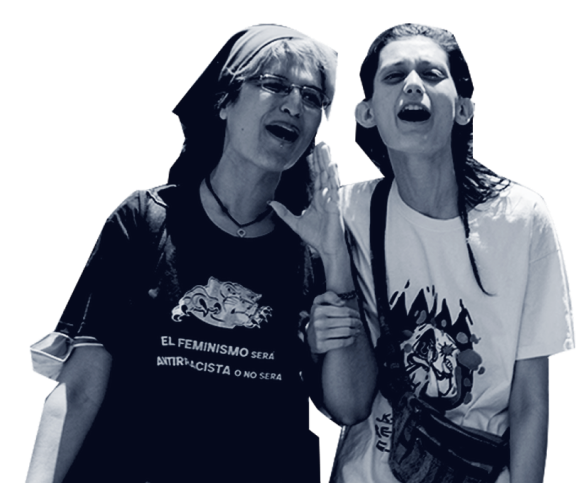
Feminist policies
A Feminist Agenda for a Feminist Europe
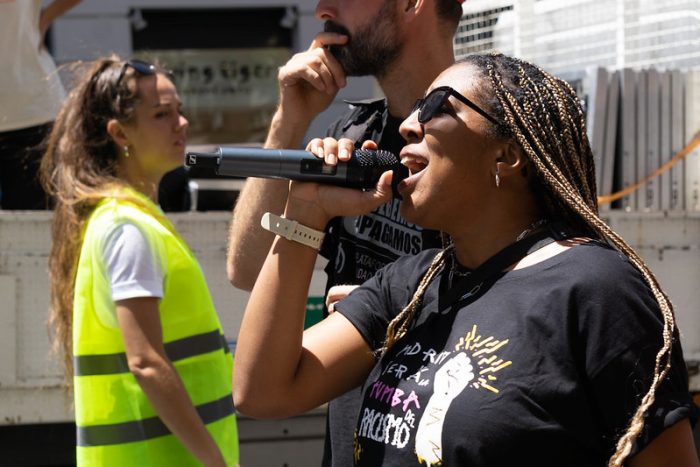
The Party of the European Left believes that a feminist political position is fundamental to imagining and creating a Europe based on peace, self-determination, freedom and equality.
We believe that feminist power is a constitutive force for new European institutions. We fight for a European constitution and a new idea of citizenship based not on borders, the market and discrimination, but on freedom, equality and self-determination of peoples: for a Europe free of capitalism, patriarchy and war.

From a feminist position, we advance a critique of the neoliberal and patriarchal political economy and propose a feminist economic policy based on overcoming the gender gap at all levels, in wages and incomes. Working life must be reformed to overcome gender boundaries.
We fight for a transversal feminist approach in all political actions emanating from the European Parliament (EP) and the EU institutions in order to guarantee a real democracy. The feminist perspective permeates all our policy proposals. Our electoral programme for the EP elections combines left-wing principles with a strong feminist perspective.
We adopt a materialist and intersectional feminist political perspective, fighting against all lines of oppression: class, gender, race, sexual identity, sexual orientation, ability, age. This distinguishes us from the liberal feminism that occupies the European institutions and risks being elitist. We don’t want equal opportunities in a world as it is, we are feminists who want to change the current state of affairs.
We unite struggles: anti-capitalist, feminist, for environmental justice, against homo-bi-lesbo-transphobia, against ableism and ageism. Our programme addresses key areas such as ending gender-based violence, ensuring access to the labour market and a robust welfare state, promoting peace and fighting fascism, recognising the intersectionality of struggles and building bridges between people in movements, securing self-determination and sexual and reproductive rights, and advocating for the rights of LGBTQIA+ people. Women’s rights and LGBTQIA+ rights are human rights. We want them to be binding and guaranteed for all, without exception, in the EU Treaties.
We propose that our group in the European Parliament adopt the colours red, green and purple.
PEACE, ANTI-FASCIST AND ANTI-RACIST FIGHT
The European area is in danger of being redrawn by the ongoing war in Ukraine. A war that, apart from causing death and devastation, is in danger of finally wiping out the remaining possibilities of a “political Europe”. We want Europe to be a player for peace, a mediator in a multipolar world, instead of relegating the European area to a subordinate role to NATO’s militarism and its expansionism. War and militarism are also the product and poisoned fruit of patriarchal violence. As a feminist political force, we want ‘war out of history’ and fight for a Europe that rejects war as a means of resolving international disputes.
As a European feminist party, we are the driving force for a different Europe, an alternative to the one represented by the militarist forces. The logic of war, which really pervades Europe, benefits those governments, such as the Polish and Italian governments, which are both the most warmongering and the main opponents of women’s self-determination and freedom. We want to counter the danger that the most conservative forces in the European Parliament will be strengthened by the winds of war. As a feminist force, we fight against the idea of a Europe of nations as well as against European nationalism and supremacism.
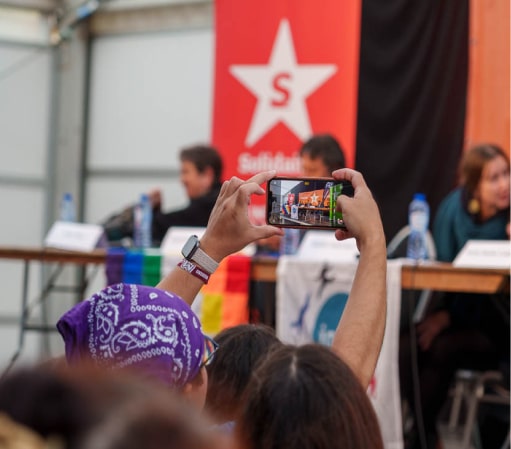

We want a care-based economy as an alternative to a war-based economy.
The increase in military spending, which affects the EU and most of its member states, translates first and foremost into cuts in public services and basic rights such as health and education. It translates into an increasingly privatised social burden on the shoulders of women. Ending wars and promoting peace and civil conflict resolution would have an immense impact on women. Indeed, it is women who are most harmed by being used as spoils of war, by being vulnerable to trafficking networks for sexual exploitation, by being left without resources or by being displaced.
The rising rhetoric of Western supremacy and the return of nationalisms go hand in hand with a worrying increase in neo-fascist violence in Europe, as the EP resolution on the rise of neo-fascist violence in Europe already noted. Post- and neo-fascism, as well as the logic of war, reproduce stereotypes and gender roles and directly attack women’s rights. We fight against the idea of women’s bodies as the incubator of the nation and consider feminism as the most radical antidote to any form of post- and neo-fascism, hate speech and patriarchal culture.
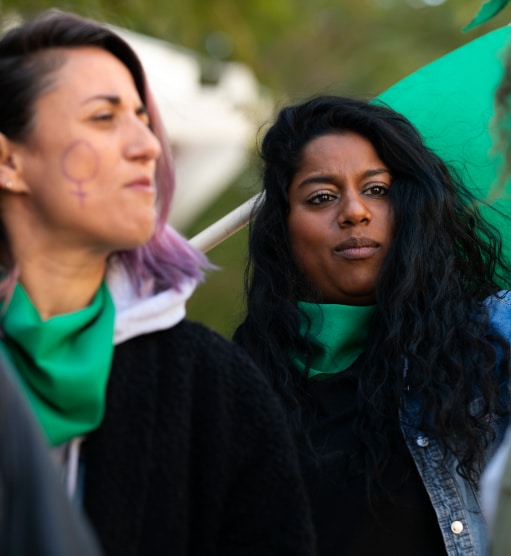
Migrant women are often rejected by Fortress Europe, and left to die in the Mediterranean or along the Balkan route. Gender discrimination makes migrant women vulnerable both in the country of departure and in the country of arrival, due to the gender gap in employment, the risk of becoming victims of abuse or trafficking, and the lack of a gender approach in EU asylum and immigration policies.
We therefore propose:
– Undoing the international division of labour
– European observatory analysing the impact of wars on women.
– Feminists as part of the negotiating tables for the resolution of military conflicts.
– Implementation and full enforcement of the European Parliament resolution on the rise of neo-fascist violence in Europe.
– A migration pact and asylum policy with a gender perspective to build an alternative to Fortress Europe.
– Strengthening anti-fascist policies and legislation, combating hate speech, xenophobia, racism and discrimination in all its forms.

STOPPING GENDER-BASED VIOLENCE
We fight against all forms of sexist violence suffered by women: domestic, sexual, psychological, socio-economic, cultural, institutional, obstetric, proxy, physical; cyber violence, female genital mutilation, forced marriage, trafficking; labour, sexual and reproductive exploitation and feminicide. It is important to name feminicide because the neutral term homicide ignores the reality of inequality, oppression and systematic violence against women.
In 2023, the European Union finally acceded to the Istanbul Convention, the most comprehensive international human rights treaty to prevent and combat violence against women and domestic violence.
The Convention is a fundamental instrument for preventing and combating violence against women in all its forms. It requires data collection, prevention and a gender perspective in many areas, from education to asylum and reception policies.
While all Member States (MS) have signed the Convention, challenges remain in relation to its ratification in Bulgaria, the Czech Republic, Latvia, Lithuania, Hungary and Slovakia. In 2020, Eurostat recorded 788 female victims of homicide by a family member or intimate partner in the 17 EU Member States that provide the data.
The EU Agency for Fundamental Rights (FRA) and the European Institute for Gender Equality (EIGE) will conduct a survey on violence against women (VAW II) in eight EU Member States (CZ, DE, IE, CY, LU, HU, RO, SE), which will complement the Eurostat-led data collection on gender-based violence and other forms of interpersonal violence (EU-GBV) in the remaining countries.
The use of a common methodology will ensure the availability of comparable data across all EU Member States. The data collection will be completed in 2023 and the results will be used to update the violence domain in the Gender Equality Index 2024 and its thematic focus on violence against women.
We propose:
- Monitoring of the Istanbul Convention, its full implementation at the EU and MS level and its ratification by all Member States, as repeatedly requested by the European Parliament and the FEMM and LIBE Committees.
- A comprehensive EU policy framework to eliminate all violence against women: strengthening the legal framework to combat gender-based violence, ensuring full implementation of the forthcoming EU Directive on gender-based violence at Member State level; legal provisions on feminicide, such as legal recognition of the term “feminicide” in the EU and in the MS; a common definition of rape in the EU and in all MS, based on the absence of consent (in some MS the use of force or threat is required).
- Support for women and LGBTQIA+ survivors of gender-based violence by providing funding for the establishment and maintenance of specialised shelters, training for professionals involved in reception activities, counselling services and helplines for survivors of all genders.
- A comprehensive policy framework for gender education to help eradicate patriarchal culture and implement educational programmes in schools (for students, teachers and technical staff) and communities to promote healthy relationships, consent and gender equality, with a focus on tackling harmful gender stereotypes and promoting gender studies at all levels.
- Invest in training on gender stereotypes and unconscious bias.
- Recognise and address the interconnected nature of different forms of oppression, such as sexism, racism, ableism, classism and homophobia; promote intercultural dialogue, tolerance and solidarity among diverse communities.
- Promote cooperation and solidarity between social justice movements, recognising that progress in one area is linked to progress in others.
- Strengthen the voices of marginalised communities and ensure their representation in decision-making processes at all levels.
- Care for victims of trafficking: Require all EU countries to respect the Palermo Protocol (2000) on preventing and combating trafficking in human beings from a human rights and gender perspective. Victims should not be punished for crimes they have been forced to commit, nor should they be repatriated without prior reparation or against their will.
- Oppose any sectarian violence against women, children, secularism and freedoms, as well as its patriarchal and anti-equality regressive policies.

FOR A FEMINIST POLITICAL ECONOMY:
CLOSING THE GENDER GAP!
At the European level, there is still a double exploitation of women in the productive and reproductive spheres: the neo-liberal and the patriarchal exploitation. The non-recognition and unequal redistribution of women’s care work go hand in hand with the increasing privatisation of public services.
This is compounded by the persistence of the gender gap in income, wages and pensions; the crystal ceiling in careers and horizontal segregation; the precariousness and privatisation of the sectors of work with the highest rate of female employment. Policies are urgently needed to guarantee equality and non-discrimination in the different spheres of women’s lives and to strengthen and expand the welfare state, including affordable and accessible health care, childcare, housing and social security systems to support individuals and families. A feminist economic policy based on care, not profit, is necessary to combat all forms of gender inequality.
We propose:
- Address gender gaps in labour laws at the national level and advocate for fair and inclusive labour laws that guarantee equal pay for equal work, combat discrimination in the workplace and ensure work-life balance.
- Close the gender payment gap by extending the standard set by the EU Pay Transparency Directive to all organisations employing workers.
- End the gender pay gap through policies to tackle inequality and by completing the EU Pay Transparency Directive. We support a statutory minimum wage at Member State and EU level.
- Extend the mandatory requirement to develop and implement a Gender Equality Plan (now required for Horizon Europe applications) to all EU funding programmes.
- An EU directive for an unconditional basic income for self-determination.
- Promote vocational training, education and career development programmes that prioritise marginalised communities, including women, migrants, LGBTQIA+ people and people with disabilities.
- Design and provide parental leave provisions for different types of household composition; define a minimum standard for parental leave and establish equal standards for paid parental leave across Member States; establish a mandatory minimum period for both parents.
- Increase public investment in quality, affordable and accessible childcare facilities, care for the elderly and support systems for people with disabilities.
- Promote public care systems through a directive as a guiding framework for the development of public care systems in the EU as a pillar of social protection and equality. Funding of projects to develop national public care systems from a human rights and gender perspective to achieve shared responsibility models of care between the state, the community and between men and women.
- Implement measures to promote work-life balance, including flexible working hours, parental leave and support for carers.
- Support bottom-up participatory urban and transport design and planning, including LGBTQIA+ people, women’s, disabled people’s, youth and migrant associations, to ensure that everyone has access to quality employment, education and social and cultural life.
- Guarantee decent work for women: equality policies must be designed to improve access to training and/or job opportunities and guarantee equal opportunities for women and men, overcoming the existing stereotypical culture of employing women in the lowest-paid or most precarious jobs.
- Stop the privatisation of social security systems, which increases the gender pay and pension gap. Pensions must be increased and guaranteed for women.
- Include a Social Progress Protocol in the Treaties to ensure that workers’, trade union and social rights take precedence over economic freedoms in the event of conflict.
- Ensuring coherence and recognition of care work: making visible the unpaid care of children, elderly and disabled family members and its importance for society.
- Require all Member States to ratify and implement ILO Convention 189 on Domestic Workers, which recognises their significant contribution to the global economy.
- Women’s rights must be binding and guaranteed for all, without exception, in EU treaties: the right to free and easily accessible contraceptive services and safe abortion, respect for sexual orientation and gender identity, equal rights in terms of pay, working conditions, co-responsibility, career development and participation at all levels.
- Women’s rights, social and environmental standards must be binding in EU trade agreements. The right to free and easily accessible contraceptive services and safe abortion, respect for sexual orientation and gender identity, equal rights in terms of pay, working conditions, co-responsibility, professional development and participation at all levels.
- The regulation of teleworking.

EMPOWERMENT FOR ALL:
WOMEN’S RIGHTS AND LGBTQIA+ RIGHTS ARE HUMAN RIGHTS
We consider women’s empowerment and freedom, the right to sexual and reproductive health and safe abortion, and the civil rights of LGBTQIA+ people as fundamental human rights. Yet they are under attack in some EU member states, such as Poland, Hungary and Italy. Instead, we see the ‘Ley Trans’ passed in Spain as a reference point for future European legislation.
We propose:
- Include the right to abortion in the EU Charter of Fundamental Rights.
- Ensure the right to free and safe abortion in public health services and sexual and reproductive health. We want to decriminalise abortion and remove and combat the remaining legal, financial, social and practical restrictions that still hamper access in some Member States.
- Ensure the right to self-determination, including the right to choose and access comprehensive sexual and reproductive health services and rights, including safe and legal abortion and reproductive technologies. We call for the full respect of women’s right to decide about their motherhood and their bodies. EU Member States should guarantee access to safe, legal and free abortion services, pre-natal and maternal health services, voluntary family planning, treatment and support, without discrimination.
- Promote gender-sensitive health care, including accessible and affordable gender-affirming treatments and surgeries.
- Implement legal gender recognition, civil marriage, and child adoption rights for LGBTQIA+ couples in all EU Member States.
- The legal recognition of LGBTQIA+ identities as grounds for asylum and protection.
- The banning of conversion therapy and trans de-pathologisation.
- The promotion of anti-discrimination legislation and the definition of hate crimes/hate speech.
- Ensure respect for diversity and non-discrimination of rights based on disability, single-parent families, LGBTQIA+, age and origin.
- Advocate for the removal of all barriers to access to reproductive health care, including financial, legal and geographical barriers.
- Advocate for comprehensive legal protection against discrimination on the grounds of gender, sexual orientation, gender identity and gender expression, guaranteeing standards and a decent life for all people in the EU.
- Support the recognition of diverse family structures, including same-sex marriage and adoption rights, while promoting inclusive education and combating LGBTQIA+ bullying and harassment.

Feminist power liberates all!
News about feminism

Related press releases
Relevant Working Groups
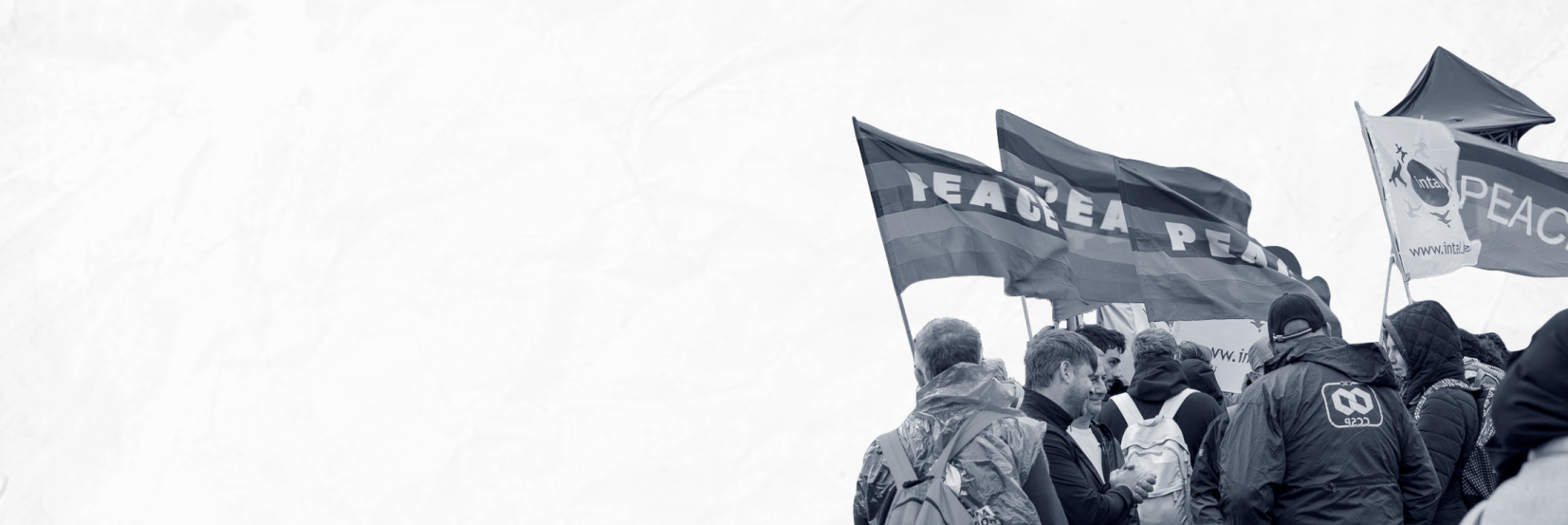
contact us!
Want to join the EL ? Any questions ?
Get in touch with us by mail, we will get back to you as soon as possible.